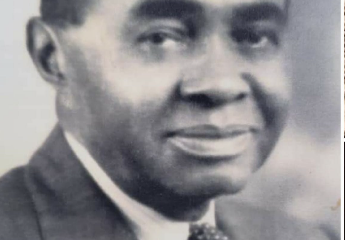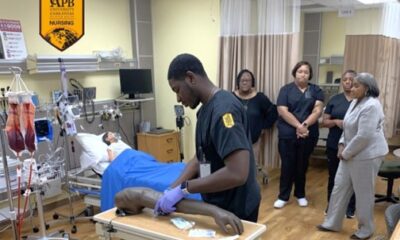News
The Wage War Pushing Many Black Women Below the Poverty Line

There weren’t many black women at the insurance company in Colorado where Camilla Jenkins works. So, when she had an opportunity to recommend someone who looks like her, someone who is black, she took it.
But, her superiors rejected the woman. She didn’t meet the requirements, they said. The woman, who was attending college at the time, needed to already have a college degree. The company hired a white woman with only a high school diploma, and Jenkins was shocked.
“It was my first real taste of the inequality as far as education,” said Jenkins, who declined to use her real name. “The same requirement is not the same for them as us. A white person with no college education can come in and get the same position instead of a qualified black woman.”
Jenkins, in need of a fulltime job, was already behind the pay curve after taking the job that paid less than the rate for her position. And any hope to catch up crumbled when they hired another white woman into the same position as hers who had less experience, fewer duties, but made $20,000 more.
Still, her story is far from unique. In fact, for many African American women, the pay disparity between them and white women is the norm. But an even greater pay disparity exists between African American women and white, non-Hispanic men.
Earlier this month on August 7th the nation recognized Black Women’s Equal Pay Day. It’s the day that marks how long into 2018 an African American woman must work before she is paid the same wages that her white male counterpart was paid by the end of last year.
Black women were paid 63 to 64 cents for every dollar a white, non-Hispanic man made, said Joi Chaney, executive director of Equal Pay Today, a project of the Tides Center, which is aimed at closing the wage gap through policies and outreach strategies.
Over the years, the gap has barely dwindled.
“Not only am I making less than a white man, but I’m making less than a white woman and I’m doing more work than she is based on our job responsibility,” Jenkins said.
“It’s been 20 years of seeing the pay disparity,” Jenkins said. “We’re not making it, not in management and not in any supervisory position.”
When she challenged her superiors about their decisions, she was told it was none of her business.
“I don’t think my piece of happiness is in corporate America. There is no glass ceiling for us.”
But the wage gap doesn’t just exist in corporate America, Chaney said. It exists in every industry, she said.
“Teaching used to be a higher-paid field,” Chaney said. “When women became the predominant workforce, the pay was depressed.”
The Money Trail
Black women are more likely to work in the lower-paying service industry where women make less per week than women working fulltime across all occupations, according to the AAUW, a charity that focuses on advancing the equity for women and girls. And there is a name for that ―occupational segregation. The U.S. Bureau of Labor Statistics shows that the percentage of black women who work for full-time minimum wage is higher than any other racial group.
And Chaney, whose organization is pushing for the minimum wage to be increased and for the passing of the Paycheck Fairness Act , said black women are often forced to take those lower-paying jobs.
“Based on circumstances, they are forced to take certain jobs because they need to take care of their families,” Chaney said. “They don’t have time to explore. They take the job that is more stable and secure in the beginning.”
About 80 percent of black mothers are the sole or primary breadwinners for their home, the AAUW reported. Black women are the heads of more than four million households in the United States and nearly one in three of those households lives below the poverty level, according to the National Partnership for Women & Families.
“So, when we have depressed wages, it not only affects us, but our families,” Chaney said.
Black women lose between $800,000 and one million dollars over a 40-year career, Chaney said, adding the less money they earn, the less money they save, and they can’t accumulate wealth. And this is not a problem about poor spending habits, she said.
“Black women can’t financially plan their way out of the wage gap,” Chaney said. “It’s not about what they are doing, but where they are being tracked to go.”
Taking A Stand
Cher’Don Russom-Reynolds was raised by a single mother whose first job was with a newspaper in Chicago that afforded them a home in a middle-class neighborhood across from Wrigley Field. But when Cheryl Russom attempted to climb higher, she was denied the position. Instead it was given to a newly-hired white woman.
“She spoke out and spoke herself out of a job,” Cher’Don Russom-Reynolds said. “Not only did they fire her, they put the word out with other newspapers.”
She couldn’t get a job and they had to move to the projects where her mom was forced to take any job she could find.
“’It’ll only be a year,’” her mom told her. But even though she was only five years old, she still recognized a lie and was always planning for a way to get out.
As soon as she could, Russom-Reynolds started working, taking any job she could find in retail until she moved on to multi-unit management and corporate positions. But she soon realized, she could only go so far.
“The higher you get, especially as a minority worker, the less they want to hear from you and the less they want to pay you,” Russom-Reynolds said. “They see value in what we bring to the table, but they don’t want to pay for it.”
She worked hard, exceeding expectations even when employers purposely set standards that were above the norm.
She said, “It almost felt like an attempt to break you.”
And after six years of being underpaid and undervalued, she left. She now runs She Prints It, LLC, a bulk apparel printing company. For those who remained, she said it’s time to start holding companies accountable such as filing a complaint with the Equal Employment Occupation Commission like she did.
Rustom-Reynolds knew when she filed her complaint that she would be out of a job. Her case was settled, but her goal was much broader.
“I knew the next time they think of discriminating against a black woman or under paying another black woman, they will think twice,” Russom-Reynolds said. “I think that’s the responsibility of all of us. We fear them firing us, but they need to fear us leaving.”

-

 Black History5 months ago
Black History5 months agoThe untold story of a Black woman who founded an Alabama hospital during Jim Crow
-

 Featured9 months ago
Featured9 months ago‘No Closure’ In Town Where Five Black Residents Were Either Murdered, Died Suspiciously Or Are Missing
-

 Black History10 months ago
Black History10 months agoBlack History Lost and Found: New Research Pieces Together the Life of Prominent Texas Surgeon and Activist
-

 Featured9 months ago
Featured9 months agoFounder of “The Folding Chair” Podcast Calls Montgomery’s Brawl ‘Karma’
-

 Featured9 months ago
Featured9 months agoThousands ‘Live Their Dream’ During National Black Business Month
-

 Featured11 months ago
Featured11 months agoJuneteenth And ‘246 Years Of Free Labor’ Are Key To Conversations About Reparations









